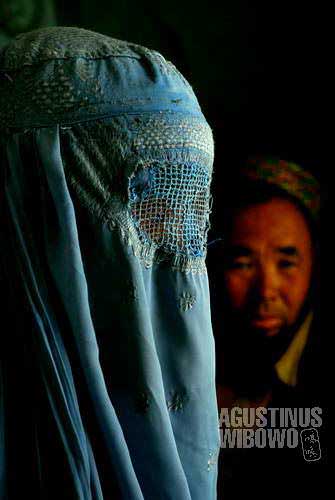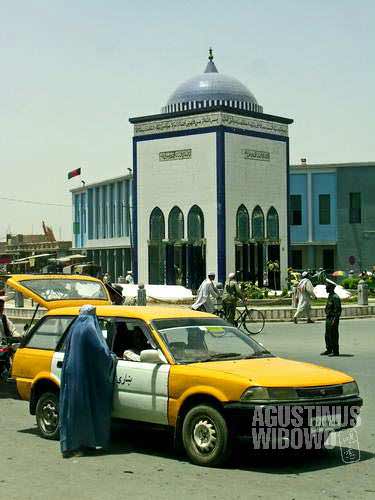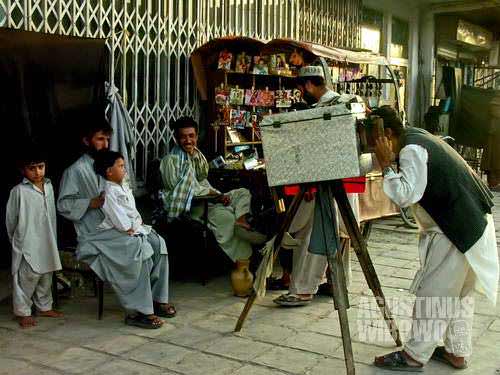Kabul – Understanding Islam from the Eyes of a Pashtun
“In Islam there is a circle. And we cannot get out the circle” — Amin
It was not easy to meet and interview people who praised a lot the Taliban regime in recent day Kabul, at least in my one month here, it was the first time I got the chance. The discussion was not political, instead it was more cultural and religious.
Amin, a man of 33 years old from Pashtun ethnic, had spent his 29 years of life in Pakistan. He was a refugee. He speaks very good English, and he expressed his idea very well in the language. He used to live in a tribal area in the NWFP (North West Frontier Province) of Pakistan, the area that the Afghans preferred to refer as Pashtunistan. The tribal areas are the areas of the Pashtuns which are not under the Pakistani law. The tribal area where he lived was Mohmand Agency. His ancestors came from a village called Kandari, both existed in Pakistan and Afghanistan side. In fact he holds two passports: Pakistan and Afghanistan.
He agreed to shelter me in his home. There is a separate guest room. In Pashtun tradition, the women of the house are not to be shown to outsider males. And in this guest room we discussed the interpretation and understanding of Islam, the most Islamic way of life as what he believed and follow.
The discussion started accidentally when I talked about our Miss Indonesia who is competing in Miss Universe competition and agreed to wear a two-peace bikini for the swimming suit competition. “You are lucky, that you have beauty in your country,” commented Amin. He inferred that in Afghanistan, the beauty of the women were not to be shown, there is no beauty in Afghanistan. “Because we follow Islam,” he said. “In Islam there is a circle, and we cannot get out of the circle.”
About the circle, he explained further, “Islam says,” –he often use this phrase as the basic of his arguments, that everything is based on the religion, “that it was the responsibility of the men to provide everything the women need. Everything. Food, clothes, cosmetics, everything they want. There is no need for women to work outside. There is no need for them to go out.”
Women working out is against the rule of the religion, as the men of the house are the providers and the protectors. How about if the woman’s husband has died, I asked. Then, it will be the responsibility of the relatives, Amin said.
If the woman has no relatives, as many males have been killed after the decades of wars in Afghanistan, then, said Amin, women were allowed to work.
It was a common situation in the war-torn Afghanistan. But as the women are used to live under the male’s custody, not many of them have the capability and education high enough to live on their own. Many end as beggars on Kabul streets.
Amin is a very religious man. He never shows his wife to others. Once, a German friend of him, a very close friend, asked whether it was possible to see his wife – a very common request in other countries. The answer was an absolute NO.
“Don’t worry, I will praise your wife, if she is beautiful,” said the German.
“Even if I agreed, my father, brothers, and even my sons will be against that,” refused Amin. None of his four children were older than 10 years old.
The refusal of showing the women to unrelated men is part of the religion, it was the Islam way, and it was about the ‘circle’ he was talking about. It is OK for woman to go out, but then they should wear burka, or at least purdah. Burka is the Afghan veil covering the women’s body from the head completely, and doesn’t even disclose the woman’s eyes. Purdah is the veil that left the eyes uncovered.
As what I have learnt in the religious classes in Indonesia, aurah of a woman doesn’t cover the face. Aurah is part of the body that not to be shown to public. Thus, the hejab that is common in Indonesia, which cover the woman’s hair and leaves the face uncovered, is enough. The definition of aurah is stated in the Holy Quran.
“No. It’s OK for women to show the face when they pray. When they are praying, the hejab doesn’t cover the face. But when they are out, they should wear burka to cover the face completely. That is what Holy Qur’an says. You didn’t study Islam properly,” denied Amin.
He told me a story, once the Prophet Muhammad (PBUH) walked on the street with his daughter. The daughter stared at a blind old beggar. The Prophet said to his daughter, “Hi daughter. Why you did that?” The daughter said that the man was blind so he couldn’t not see her anyway. “It is not fair, daughter. He is blind, but you are not blind.”
It is forbidden to see the members of opposite sex.
Why Islam (thus, in his understanding) is so strict about this? Amin gave an example, “Islam says that women are too beautiful to go to the bazaar to buy make-ups. If they wear make-ups and attracted attention of the men, the men will want to get her, and sometimes with the force.” It means that if women get raped, then it was the mistake of the women to be too much attractive, not the mistake of the men not being able to control their lust. He didn’t deny, instead, he made another metaphor. He took a candy from the saucer next to our tea-pot.
“Look at this candy. If I like the candy, then I will try to get it. Legally or illegally. Understood?”
“And why illegally is permitted? You are allowed to take the candy if it’s legally yours. There is law to protect that.”
I still didn’t understand his metaphor. He took another metaphor if I had much money, then he asked for my money, and I didn’t give him, then he would kill me. I said that the money was my possession, and it was my right to give or not to give. But he said, “Why you didn’t share the money?”
Perhaps the concept of “right and duty” (hak dan kewajiban) is too strong impressed in my Indonesian mind.
“You know AIDS? Until now, there is still no vaccination for AIDS. But our Holy Islam has the way.” Forbidding interaction between men and women, thus making the chance of sexual relation between them, has made AIDS bearers in traditional Muslim countries are low. In his understanding of Islam, even the eye interaction between opposite sexes is sinful, and that will bring to adultery.
I said that burqa was only to be found in Afghanistan, and purdah was not popular in other Muslim countries like Indonesia and Malaysia. I thought that it was merely different interpretation of the religion, between Islam in Indonesia and in Afghanistan. He denied.
“No, Islam is one. The rules are the same,” he said. “Our Holy Qur’an said that there would be 71 different groups of Muslims, but only one of them was the real Muslims. The others are not.”
“So do you think that Afghans are the real Muslims?” I asked
“I can’t say for all Afghans,” he said.
“So which people are the closest to the real Muslims?”
He mentioned the Pashto speaking people under the Taliban regime were the people who followed the Islam way. He despised the Dari speaking people. The Dari speaking people are out of the circle already, said him, the women went out everywhere. Dari and Pashto are the national languages of Afghanistan, the Dari speakers consist of Tajiks, Hazaras, and Persians. The Pashto speaking people are the Pashtuns. I felt he has strong nationalism of his ethnic. Once he was sorry that I studied Farsi instead of Pashto. He said that Farsi was feminine language, language of women. Pashto is language of the men. He was also proudly stated that the Afghans were one among two nations that was mentioned by Adolf Hitler as the strong nations (the other one was of course German).
Back to Muslim community under Taliban, he said that it was the closest community as what was the Muslim Sharia community under the leadership of the Prophet Peace Be Upon Him, 1500 years ago. “We follow the Islam way. If someone steals, the hand should be cut. Then nobody dare to steal. That is the most justice way.” He was not the first person I met to praise the good security that Taliban has brought to the country. “During Taliban time, you will not be afraid to travel with thousands of dollars cash. Nobody will rob you.” The Taliban successfully put the legendary robbers of the southern highway on bay, by giving permission to punish the looters with death penalty on spot, put the criminal’s head on one side of the street, and the body at the other side of the street. This was a very successful shock therapy and made other criminals think twice before committing crime. “Now, how many countries try to bring the law of their own to Afghanistan?” he asked rhetorically, inferred that those un-Islamic law was failed to bring security to the recent day volatile Afghanistan.
Amin follows the way of Islam as much as possible. And so is the whole of his family.
“My brother, Qur’an Hafez, is very educated. He read our Holy Qur’an and understood it. He speaks many languages: Arabic, English, Pashto, Dari, Urdu. But he likes computer so much. My other brother, Subhanallah, is reading in medical school. But he also likes computer very much.”
The use of ‘but’ made me think that computer was un-Islamic. I didn’t ask his confirmation about this.
“Once my father didn’t want to talk with me, because I like to watch TV very much,” said Amin. I was surprised. TV is not Islamic?
“My father said, if you watch TV, then tomorrow your wife will also watch TV. You and she will watch TV together. From the TV she will learn the movies, she will go out,” Amin explained to me.
It seemed that the main reason that TV was forbidden was more to protect the culture, the way of life. Under Taliban it was not only TV was forbidden, even music is haram.
“Qur’an says, music is haram,” said Amin, “because if there is music, I will dance. Then you see me, and you will dance also. And when a woman passing…”
“But the women don’t go out,” I argued.
“For example, this is a picnic (in open air) …”
He meant that dance would bring the interaction between male and female, and interaction is always interpreted as sinful as extramarital sexual contact. In Indonesia, never music, dance, and TV declared as un-Islamic, except the recent case of the erotic butt dance of a dangdut (Indonesian music) singer, Inul, which attracted condemnation of the Ulemas. In Afghanistan under Taliban, it was out of question.
The television also broadcasts many aspects that are against the traditional culture of the Afghans. The recent TV serial of the Afghan TV is a Farsi-dubbed Indian serial. Everybody likes to watch the serial, sits beautifully in front of the TV set at the afternoon when the broadcast time comes, and some even watch the re-broadcast time at the morning after. The movie talks about Indian family life, a Hindu family, and includes love stories of the characters. Love is for sure out of question. Many condemned that these foreign cultures will influence Afghan (thus Islamic) society. I asked whether his culture was that weak that the women can be easily influenced by the movies. He said that people were uneducated, and they easily copied what they saw. The women would buy cosmetics, useless things, instead of buying the basic needs of the family, which is expensive in Afghanistan.
The impact of TV to the local culture is not only problems of Afghanistan. Indonesia also has the same problems. The local media was recently flourished by nonsense programs, both from abroad and local, less educative, and instead introduces mysticism, criminality, sex contents, etc. There is a movement of “No-TV day” ( National Children Day without TV) in hope to protect the children from the bad influence of TV programes. But in Afghanistan, religion was always the strongest reason of everything.
The spirit of revenge and killing was strong in him. He said when there was war between Taliban and America, the Taliban soldiers sometimes jumped to the roof of the civilians, attacked the American helicopters, and left the dwellers of the house unharmed. But when Americans came to the house, they killed all of the members of the house: men, children, women. “If that happened to yourself, will you not kill all Americans?” asked him. For him, there is no difference between the American government and American civilians. In southern Afghanistan, they even didnt care anymore whether someone was American or not. All foreigners posses the same risk of being attacked.
He is not afraid to be said religious. Once he went to ISAF office for interview, the American interviewees greeted him, “You look like Al-Qaeda.”
He replied, “If you say Muslims as Al Qaeda, then, yes, I am Al Qaeda.”
The American big guy was surprised by his answer and get angered.
When he talked, he chewed naswar. I thought that it was also mentioned in the Holy Book. “No.., no…, naswar is haram!”. Naswar is haram? I was surprised. Many Pashtun men chew it, as many as Indonesian men smoking cigarette. “Cigarette is also haram,” he said, “but all people have something like naswar. You have cigarette, others have alcohol.” Under Taliban naswar was declared haram, but unlike users of alcohol, chewers of naswar never been punished. It has been deep rooted in the nation, that many people complained they could not sleep if they did not chew naswar that day.
Amin was outside Afghanistan most of his life. He was in Afghanistan under Taliban and worked as interpreter for the United Nations. He has many foreign friends, to whom he explained about Islam. One of the Japanese friends, Takeda, trusted him a lot, and at that time when security situation was very bad, Takeda agreed to went out alone with him to his house. Takeda trusted him so much, as a very good Muslim.
Amin’s concept of Islam might be not accepted by other Afghans or other Muslims in other parts of the world. But he is determined in every bit to be in the correct way. And as it was said, among the 71 different groups of Muslims, there was only one real Muslim. Which group that is, maybe only God Himself can provide the answer.









Good and interesting article. Thanks 🙂
i’m a muslimah,and i agree with your last sentences:”…only God knows” — thanx for this interesting article